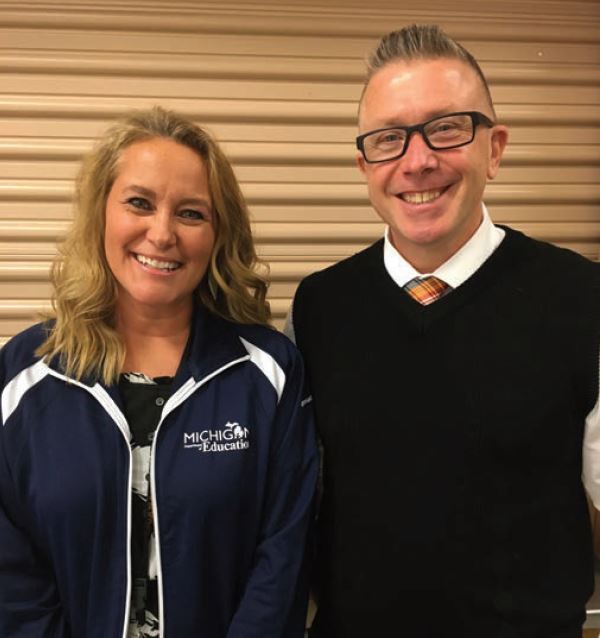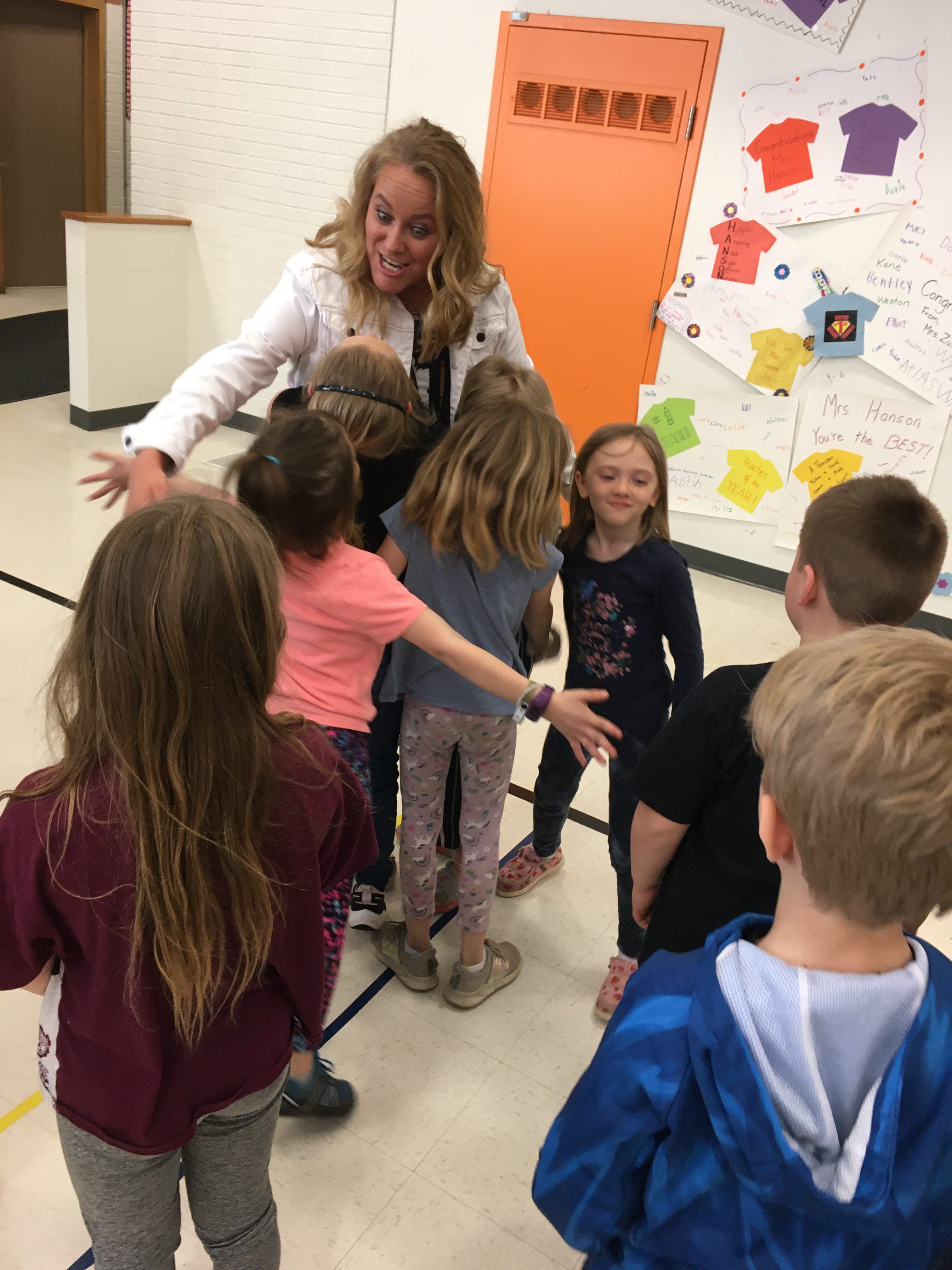Escanaba Educator Named Michigan Teacher of the Year: ‘I want to be that light in someone’s darkness’
Although MEA member Nanette Hanson has achieved rarefied status as the newly crowned 2022-23 Michigan Teacher of the Year (MTOY), the first grade teacher in Escanaba embodies the story of so many educators.

Troubled by low self-esteem growing up in the small Upper Peninsula town of Gladstone, Hanson said in an interview it was caring teachers who “flipped the switch” to awaken her sense of accomplishment and belief in herself.
“I just knew I wanted to be that person for somebody else,” she said of her reasons for joining the profession. “Every day is an opportunity for me to forge that relationship and be that light in someone else’s darkness.”
Her middle school band and choir teacher – a man who was “bigger than life” and a “ball of light” – saw something in Hanson she didn’t yet see in herself, she said. “Even if you weren’t outstanding musically, he would find something about you and make you feel important.”
Later a high school French teacher recognized Hanson – an A and B student – was capable of accomplishing great things. “It never dawned on me. I didn’t know that in my heart until they kind of saved me and put me on the right track.”
Today at Lemmer Elementary School in Escanaba, Hanson pays it forward, using humor, individual attention, and inclusion to make school a safe place where youngsters feel heard, accepted and empowered.
“I want them to leave first grade with the feeling ignited in their belly that they like coming to school and they love learning.”
Every day begins with her welcoming each student at the door with a high-five, hug, knuckle bump or other custom greeting selected by the child. At the same time she finds something to notice about each one.

“I’m saying ‘Good morning’ and ‘Hey, I love the way you’re following the rules in the hall’ or ‘I saw you help your friend’; ‘I love the bow in your hair’ – something that’s just letting them know I’m totally tuned into them.”
Because the school has a high percentage of students who qualify for free and reduced lunch, all children receive breakfast in class, a time Hanson calls “morning meeting.” Before the meal, the kids place a sticky note with their student number on a poster depicting different feeling faces.
“They can show me – hey, I’m ready to learn, or I’m fidgety today or I’m feeling kind of sad.”
Then while everyone is eating, she can pull individuals aside to check in, “and it’s a safe place for them to say, ‘I miss my mom,’ or ‘there was a lot of yelling at my house today,’ or ‘I forgot my socks,’ or whatever it is.”
Social-emotional learning is important work she does, Hanson said, recalling a different culture when she was growing up that told children struggling with big emotions to “Suck it up. Put a smile on.”
“If they’re tired or hungry or sad, they can’t learn. I’ve got to find out what they need so we can get those basic needs met and move on from there.”
Hanson models inclusive behavior so every student feels accepted. “In my classroom we open the door for lots of student talk where we’re all giving our ideas, we’re all valued, we take turns. We have the discussion about respecting others for their differences.”
Over 20 years Hanson has seen the power of love and acceptance, starting with at-risk teens in an alternative high school and moving to other grades before she settled at first grade 16 years ago.
Her Daily 3 in math each morning and Daily 5 in literacy after lunch rotate students through a mix of group and individual instruction, practice, spiral lessons, and more practice. She takes cues from students for what interesting tangents to follow in their lessons, reading, discussions, projects and standards that need reteaching.
She worries about lawmakers proposing bills that would require educators to post lesson plans, assignments, reading materials, tests and field trips a year in advance. “This is concerning to every teacher everywhere,” she said, adding that some of the best learning last year happened when students followed their interests in project-based discovery.
“I could not submit a whole year’s worth of lessons because we cannot squash kids’ creativity. I should be able to spark the interest of kids in a way that’s exciting to them and lets them run their own learning in a way that’s meaningful,” she said.
The focus after two years of the global pandemic should be on equity and mental health, delivering supports to strapped communities and families so children have equal opportunity to learn and ensuring everyone in the system – school employees and students alike – have access to mental health services.
For the next year as MTOY, Hanson will serve as a voice for the state’s teachers, who she worries are exhausted and overwhelmed from “doing more and more with less and less, because we are caring and loving—teachers are doers. But we have our limits and people are burning out.”
Educating the next generation is some of the most important work in the world, so recruiting and retaining high-quality, diverse educators is critical to the future, she said, arguing for better compensation overall and more programs to entice young people into the profession before college.
“Let’s get kids in the classroom when they’re in high school for a little job shadowing and practicum work, so they can see that teaching is more than delivering a lesson. It’s about forging relationships, making kids feel safe, and embedding that feeling of I can do this – I have something to offer.
“I think if high school students see that, they’ll say to themselves I want to be that for somebody else.”
Related story: More districts start programs enticing students to teach
Hanson does her part to build up the profession, serving in multiple leadership roles at the building and district level, according to Principal Paulette Wickham.
She mentors two early career teachers in the district, always giving of her time and attention but also noting how much she learns from beginning educators as well. “She has that mindset of a lifelong learner, improving her craft as she’s helping our new teachers develop theirs,” Wickham said.
Amid the demands of the last two years, Hanson literally went the extra mile to ensure students had the equipment they needed – often driving long distances to homes where she helped kids, parents and grandparents to access and use technology.
Kids describe Hanson as funny, loving, and kind, Wickham said, adding that some needed several hugs from her before walking out the door on their last day of school in June.
“She’s there for everyone, and she’s willing to move mountains to make sure all of her kids have the same opportunities as everyone else. She’s almost like a second parent – her students know they are very well loved.”


